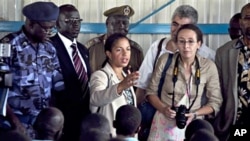As a delegation from the United Nations Security Council arrives in Sudan to preach peace and a timely referendum, South Sudan President Salva Kiir has offered pardons to southern rebel movements in the hopes of unifying the region in advance of the vote.
The signing of the 2005 Comprehensive Peace Agreement between Khartoum and the Southern People's Liberation Movement was supposed to bring peace and development to the largely rural south. But since the end of the civil war, a host of rebellions started by former military officers have plagued the fledgling government.
Presidential Pardon
Wednesday, South Sudan President Salva Kiir issued orders granting rebel leaders George Athor, Gatluak Gai and Gabriel Tanginye amnesty and inviting the men to rejoin the southern forces.
All three men are former officers in the Southern People's Liberation Army who have gone rogue to settle grievances with the state.
Tanginye, known as Gabriel Tang began his insurrection in 2006 near the Upper Nile capital of Malakal. Athor and Gai both clashed with southern forces after losing gubernatorial races in the April 2010 national elections.
The pardons were first announced by SPLM Deputy Secretary General Anne Itto, who said they would be granted "on the condition they stop doing what they are doing against the state." Amnesty has also been extended to troops commanded by the rebel leaders.
Destabilizing risks
The Geneva-based Small Arms Survey lists the rebellions as major destabilizing risks in post-referendum Sudan, and reintegrating the forces could provide the troubled region with a degree of security.
But other issues could complicate the process. Southern Sudan is extremely poor and largely undeveloped. The region is nearly the size of France, but has less than 80 kilometers of paved roads.
A spokesman from UK-based Oxfam, Alun McDonald, says issues of poverty must be dealt with to avoid future violence.
"Aside from the political issues that are still to be resolved, the two key issues really, at the moment, are protecting people from violence; from the violence that is happening now and also could increase in the run-up and after the referendum," McDonald said. "The other really concrete thing: Southern Sudan is incredibly poor. It is one of the poorest, least developed regions in the world. People do not have access to clean water, schools, hospitals, none of the basic services are available in southern Sudan for most people. I do not think any peace deal can be really sustainable, can last, unless that kind of poverty and lack of development is addressed."
Host of problems
With just three months until South Sudan's referendum on secession, fear is mounting that a host of problems surrounding the vote will lead to renewed violence with the government in the north. Among other issues, the two have yet to agree on oil-sharing and border demarcation, seen by many as critical for post-referendum stability.
On January 9th, the region is widely expected to vote for independence and many southern officials, including President Salva Kiir favor a split.
Role of UN
Mr. Kiir's pardons come as the United Nations Security Council tours the country, urging both sides to reach an agreement on those critical issues and avoid a return to violence. The 15 representatives met with members of South Sudan's police forces as it races to strengthen security ahead of the January vote.
The group will also travel to the war torn Darfur region before meeting with officials in Khartoum. The group has made it known that Sudanese President Omar al-Bashir, who is accused of committing war crimes in Darfur, will not be present. U.S. Ambassador to the United Nations Susan Rice has said the group will push for the referendum to be held on-schedule and assess the humanitarian situation in Darfur.
Southern Rebels Granted Pardons as Security Council Tours Sudan









